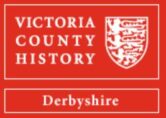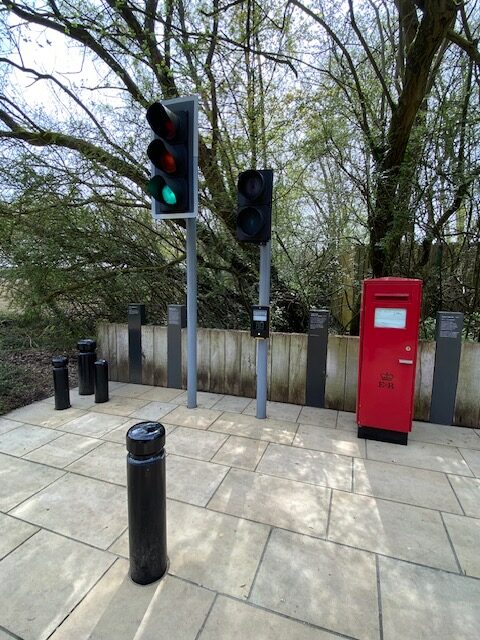Markham’s meal as out-going mayor – a lavish affair
In this blog we take a look at a lavish dinner thrown by members of Chesterfield Corporation, in 1911, to celebrate the final year of retiring mayor Charles Paxton Markham. And it may well surprise you as to just how lavish it was. We’ll also take a brief look at Markham’s final spell as mayor and the man himself.
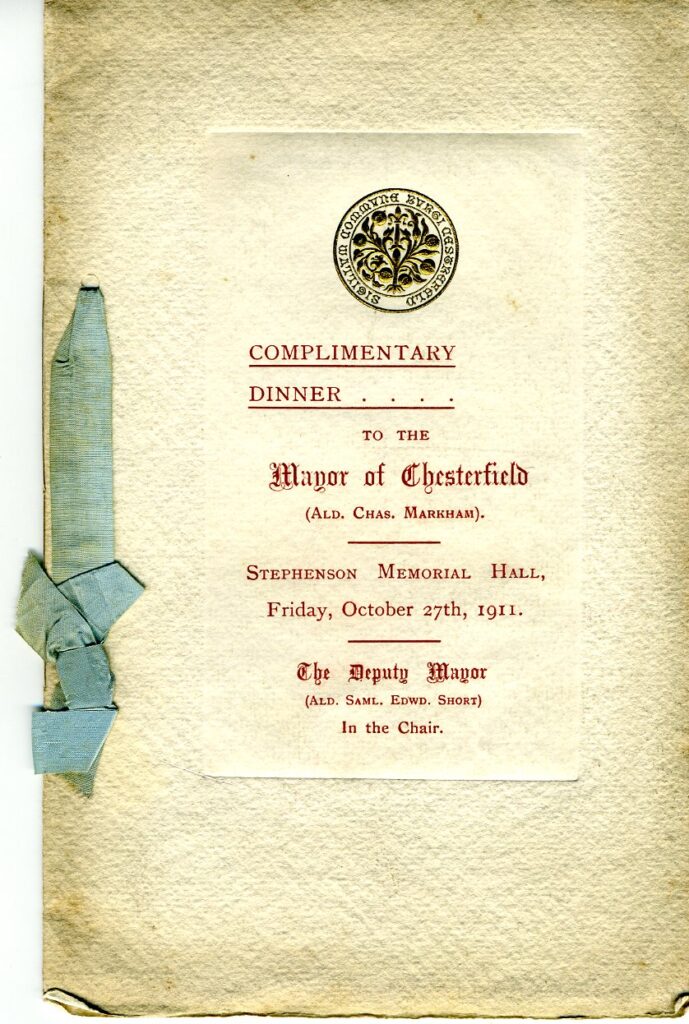
It’s Late October 1911 and Charles Paxton Markham (1865-1926), who many later regarded as the ‘uncrowned King of Chesterfield’ is just about to complete his spell as mayor for the third and final time. Markham, without doubt the area’s leading industrialist (and perhaps politician) at the time, was entertained by the corporation members to a sumptuous dinner at the Stephenson Memorial Hall. Thanks to one of our member’s who has leant us a copy of the menu, we can look at that grand mayoral dinner and just what was on the menu.
CP Markham

Markham was the managing director and chairman of the Staveley Coal & Iron Company and had many other industrial interests. He had a reputation of being a man who wanted to get things done and wouldn’t let things get in his way too much. He personally paid £10,000 towards clearing the notorious Dog Kennels slum housing area and construction of a new road through a part of them – known as Markham Road – completed by March 1912. The Dog Kennel clearance had become something of a personal crusade to Markham.
Markham had started to become interested in social conditions and housing matters, including those for whom he employed. But he was equally a man you would not want to cross unless you were well prepared or didn’t work for him! Despite these later interests in the welfare of his workers he was anti-union. A few years later he would describe unions as one of the worse things that could have happened to workers.
Markham had first been elected as Mayor in 1896, a term of one year, which was to be repeated for two years from 1909. In 1910 he was also elected as one of eight aldermen and a little later the same year an Honorary Freedom of the Borough was also conferred on him. He was first elected to the council in 1895, serving on it until 1920.
The complimentary dinner
So, to the ‘complimentary dinner’ that members of the town council threw for Markham as he retired from his mayoral duties. And it was right royal affair – fit for an uncrowned king!
Just take a look at the menu below. Starting with ‘native oysters’, we then move into Turtle soup, followed by a second course with all manner of delicacies, all rounded off with fruit and coffee. The wine list also looks interesting, with presumably different wines served at different points in the extensive menu.
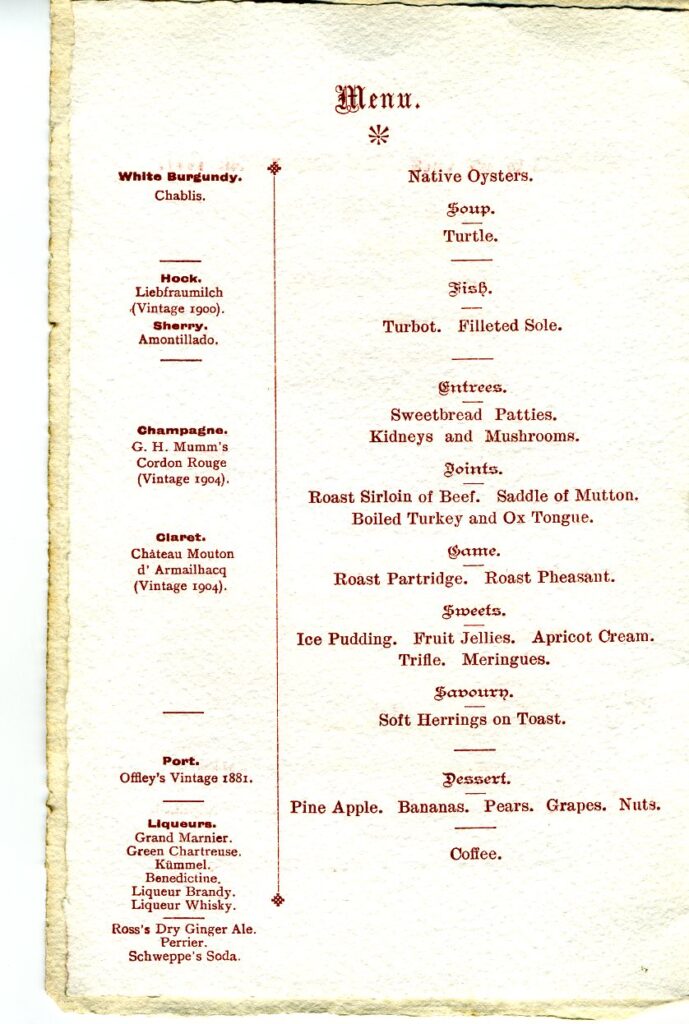
It’s not known who paid for this dinner – but it is possible that members of the corporation themselves paid for it, as their thanks to the outgoing mayor (this tradition lasted until recent years). The corporation at that time consisted primarily of business men in the borough – people who would generally be of some means. But whoever did pay for it, it might well have been regarded as one of the social events of the year.
The new Mayor – The duke of Devonshire
Markham was replaced as Mayor by the duke of Devonshire, in early November, at the mayor making ceremony, with Alderman Markham becoming deputy mayor – a separate occasion to the complimentary dinner. It is believed to be the first time that the corporation had sought a mayor from outside its elected body. (The duke was, of course a member of the Lords, but was also a county council alderman, Chairman of the Bakewell Board of Guardians and had been Mayor of Eastbourne. It appears that the council wanted to use his expertise in promoting the borough and in its governance).
Markham’s ‘splendid mayoralty‘
In reporting the mayor making ceremony, the Derbyshire Courier’s headline expressed; ‘Alderman Markham’s splendid mayoralty’. (The Courier was one of the two Chesterfield based newspapers of the era).
In reviewing his two years in office the Dog Kennels’ area improvements were stressed. Markham himself made reference to extension of the borough (in 1910) and improvements to the Queen’s Park Annexe which had been started.
In typical Markham fashion, he announced that he and Major Clayton, as Trustees of the Jubilee Drill Hall, had executed a deed to hand it over to the town, if the Territorials using it were to disband. The rider being that there was a big debt on the building – if the town were to pay it the trustees might well hand it over! (This building was much later owned by the borough council. From 1970 it opened as an entertainment centre, renamed as the Goldwell Rooms, and was used as such until the Winding Wheel Theatre opened).
Markham expressed pride that the town were early adopters of ‘town-planning’. Lordsmill Street had been widened – but he hoped that more of it could be so treated – St Mary’s Gate was ‘a disgrace to the town,’ he said. The sewage works had been modernised and work was planned to widen Hasland Road.
Perhaps somewhat confusingly Markham also promised to hand over the deeds of ‘Eastwood Park’ to the town council. This, he said, was land he acquired some time ago, but that he had held onto during negotiations with the Midland Railway when the line through Chesterfield was quadrupled. (This is probably a piece of the frontage of the park, presented in 1913 – though is some miles distant from the railway).
Markham did think a good job had been made of the coronation celebrations held in Chesterfield of King George V.
All-in-all this was typical Markham stuff, in times when the mayor was seen as something more than the mainly ceremonial role played today. It’s clear from the Courier’s review that Markham had given the council (he sat on all the committees as mayor) the benefits of his considerable knowledge.
Difficulties
But there had been also been some difficult issues – perhaps in particular the August 1911 railway riot. Here Markham had to read the riot act, in order to deploy military forces against striking and rioting railway workers.


The extension of the borough in 1910 had not realised all the corporation’s wishes. Their desire to extend into Whittington and completely into Newbold was not met. Thus were sunk aspirations to become a county borough.
Due to the extension, elections were required to the council. In those days the electorate for the town council was much more limited than today – more likely to vote for those, as Frank Wright in his volume (IV) of the History of Chesterfield puts it; the ‘shop-keepers, professional men, manufacturers and engineers’ that were elected to the council.
Indeed, the unofficial opposition during the period was mainly from Chesterfield Trades Council (the group still with us today of trades unions in the area). They had, for example, written to Markham (as mayor) in April 1910, objecting to the £4,000 that was to be spent on the Queen’s Park Annex. So, the elections of November 1910 returned the usual mix of people. Perhaps the return of the status-quo was somewhat celebrated at the complimentary dinner a year later. Entertaining was, of course, much more lavish back then and Markham and his cohorts would have been used to rather more food than we are today. More (albeit earlier) examples of this type of entertaining are given by Markham’s sister -Violet – in her autobiography ‘Return passage’.
The complimentary dinner does not seem to have attracted the Courier’s attention, though that newspaper’s rival – the Derbyshire Times – did briefly mention it in fulsome terms. But it lamented that a fuller report could not be given due to the private nature of the event. The newspaper was able to record that the duke of Devonshire’s speech apparently embodied the ‘highest ideals of public service, and one which might cause many of the critics of municipal management to think furiously’. The menu was not mentioned.
One might imagine that the vast majority of Chesterfield residents would have been quite surprised, with some of them possibly outraged at the dinner’s menu and indeed the expense of whole event.
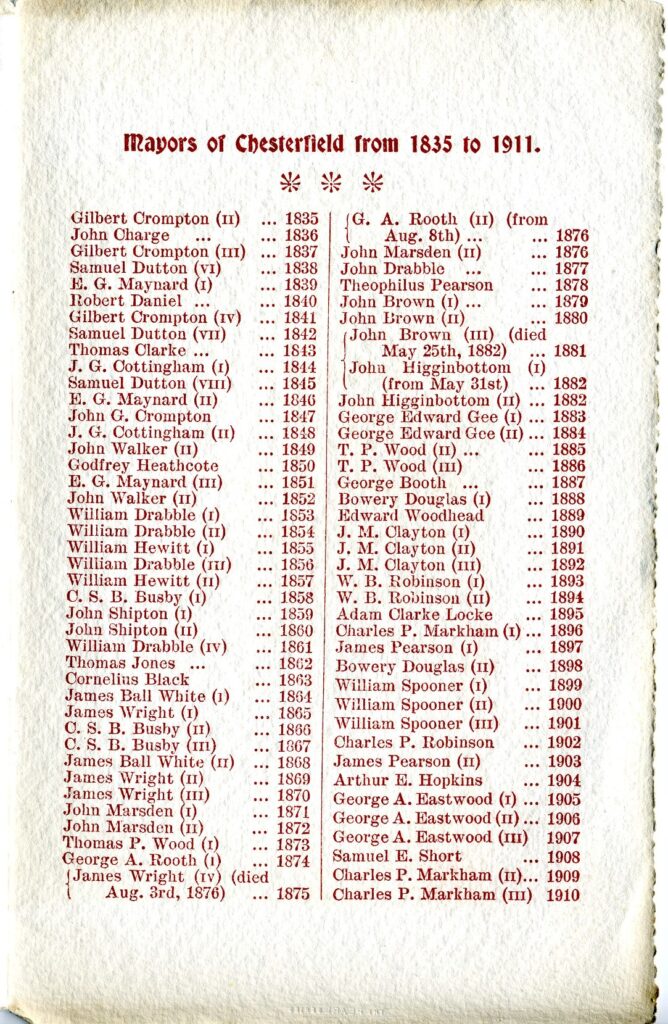
Sources:
- The complimentary dinner menu.
- Derbyshire Courier 4 and 11 November 1911.
- Derbyshire Times, 4 November 1911.
- V Markham, Return passage (1953).
- J Murphy, ‘Chesterfield’s drill halls’ The Cestrefeld Journal, number 8, 2023.
- TF Wright History of Chesterfield volume IV (1992).
- Chesterfield yearbook and directory for 1913.
Markham’s meal as out-going mayor – a lavish affair Read More »
